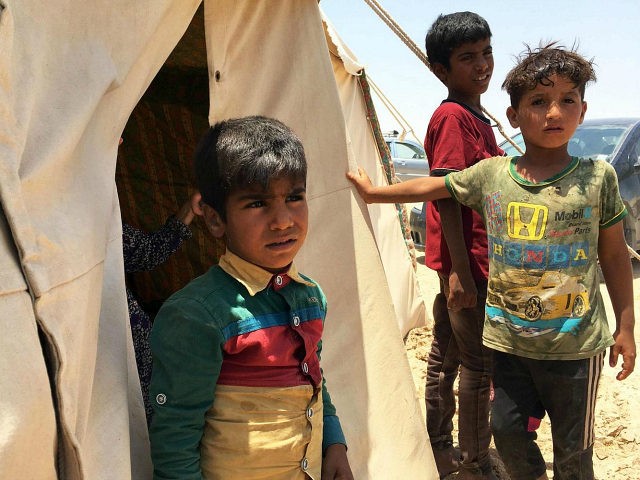At least 20,000 children remain inside Fallujah, facing food and water shortages in addition to the extreme violence that has erupted as Iraqi forces, backed by the U.S. military and Iran-allied Shiite militias, fight to retake the Iraqi city from the Islamic State (ISIS/ISIL), reveals a component of the United Nations.
On Tuesday, the United Nations High Commissioner for Refugees (UNHCR), also known as the UN Refugee Agency, estimated that a total of up to 50,000 civilians remain trapped in Fallujah, one of two remaining Iraqi strongholds controlled by ISIS.
The other stronghold is Mosul, Iraq’s second-largest city.
ISIS jihadists and the heavy bombardment by Iraqi troops are preventing the thousands of civilians, which also include women, from fleeing, noted UNHCR, adding that there are “several hundred families being used as human shields by ISIL in the center of Falluja.”
Citing data collected by local authorities, UNHCR reports that about 3,700 people (624 families) have escaped the city. Hundreds of them have moved to two camps while others are staying with relatives and extended families.
On Wednesday, the United Nations Children’s Emergency Fund (UNICEF) reported that thousands of children have become victims of the deteriorating security conditions in the besieged city of Fallujah, which lies nearly 35 miles west of Baghdad in Anbar, Iraq’s largest province.
“As the violence continues to escalate in Fallujah and across Iraq, we are concerned over the protection of children in the face of extreme and rising danger,” Peter Hawkins, the UNICEF representative in Iraq, said in a statement.
“UNICEF estimates that at least 20,000 children remain trapped in the city,” he added. “According to reports, food and medicine are running out and clean water is in short supply.”
In a separate statement, the World Food Program (WFP) noted that the humanitarian situation was getting worse as food shortages were driving up prices to a level few can afford.
Fallujah was inaccessible to aid, making impossible the distribution of food to markets, added the WFP statement.
“The only food available does not come from the markets, but from the stocks that some families still have in their homes,” it said.
UNICEF’s Hawkins pointed out that children are facing the risk of being forced to fight on behalf of ISIS. UNHCR noted that the jihadist group was executing men and older boys who resisted the forced recruitment into the fighting.
“Children who are recruited see their lives and futures jeopardized as they are forced to carry and use arms, fighting in an adult war,” Hawkins declared. “UNICEF calls on all parties to protect children inside Fallujah, provide safe passage to those wishing to leave the city and grant safe and secure environments to displaced civilians.”
According to the UN Refugee Agency, the Iraqi forces are assisting people who want to leave the city.
However, males seeking to flee Fallujah, including children, are reportedly being subjected to security screenings by the Iraqi military.
“UNHCR understands approximately 500 men and boys over 12-years-old are held for security screening which can take five to seven days. People are being released after this process, and we understand some 27 men were released yesterday [May 30th],” pointed out the UN agency.
Reuters reported that the Iraqi troops are systematically separating the men and boys from their families to check for possible ties to ISIS.
“Other reports say a number of people attempting to leave have been executed or whipped, and one man’s leg was reportedly amputated,” revealed the UN Refugee Agency. “In addition, many people are reported to have been killed or buried alive under the rubble of their homes in the course of ongoing military operations.”
“Conditions for those trapped in the city are dire. UNHCR previously noted reports of several starvation-related deaths amid food shortages,” it added. “Families have had to rely on unsafe water sources, including drainage water from irrigation canals. Health facilities and medications are unavailable.”
The Iraqi forces, backed by Shiite militias and U.S.-led coalition airstrikes, launched the offensive to seize the city back on May 23.
Iran’s Lebanese terror proxy Hezbollah is among the Shiite militias fighting to retake Fallujah, the first Iraqi city to fall into the hands of the Sunni jihadists in 2014.

COMMENTS
Please let us know if you're having issues with commenting.